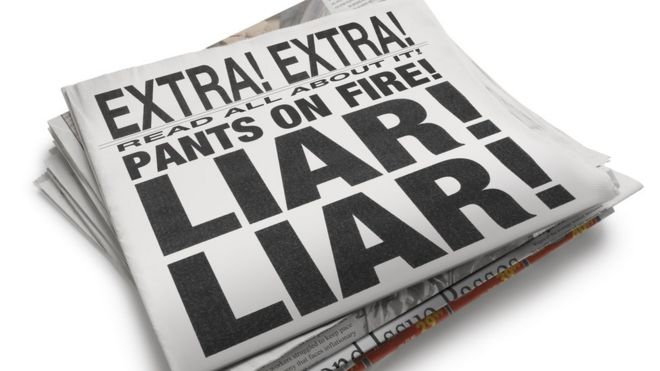
(image source: http://www.bbc.com/news/blogs-trending-37846860)
Consider this situation – You are a journalist in a newsroom. As a deadline is fast approaching, you won’t have time to check every detail of the story as you normally would. In fact, you are short a couple of stories. You have a look at what is trending on social media and internet sites in the hope of finding a quick lead. You find a couple that seem quite credible. The stories are in … but you discover all the information you used is incorrect or false.
Assistant Professor of Journalism at Ithaca college Anthony Adornata, conducted a recent study on social media’s impact on newsroom editorial decisions. He concluded that a third of respondents indicated their stations have reported information from social media that was later found to be false or inaccurate. Forty percent of newsrooms didn’t have an editorial policy concerning social media and while Facebook is trying to stop the spread of fake news by new algorithms, their admission is “We cannot become arbiters of truth ourselves — it’s not feasible given our scale, and it’s not our role.”
This is an issue with the spread of fake news. It is not the stories that are obviously wrong and misleading or have a satirical purpose, it is the stories that may have some truth to them, but they are not completely accurate.

A front page of an issue of Time magazine claimed, “Russia wants to undermine faith in the U.S. election”. It was later found that the Russians did not try to undermine the recent election. The source should have been checked first!
For the time and resource poor journalist, not checking sources adequately can be a trap.
BBC Trending (2016) The rise and rise of fake news. [available] http://www.bbc.com/news/blogs-trending-37846860
Deliberately making up news stories to fool or entertain is nothing new. But the arrival of social media has meant real and fictional stories are now presented in a way that can sometimes be difficult to tell the two apart.
All of these forms of alternate ‘journalism’ rely on being transmitted to the wider population by a communication means. In the internet age, fake news and propaganda reach a mass and widespread audience by the use of the internet and social media.
With news services stretched for resources and the sheer volume of information available, it is impossible for journalists, or for that matter the public, to be able to source the accuracy of all information.
Winston Churchill is believed to have said “A lie can go halfway around the world before the truth gets a chance to get its pants on”.
The internet can reach a mass audience and the volume of information available on these sites makes it near impossible to check everything.
Where does this leave journalists and newsrooms? Source vetting would be a good start … if only there was the time.
References:
@ anthonyadornato (2016) Study Reveals Social Media’s Impact on Newsroom Editorial Decisions [available] http://anthonyadornato.com/study-reveals-social-medias-impact-on-editorial-decisions/ [accessed 5.09.2017]
BBC Newsround (2017) Fake news: What is it? And how to spot it [available] http://www.bbc.co.uk/newsround/38906931 [accessed 2.09.2017]
BBC Trending (2016) The rise and rise of fake news. [available] http://www.bbc.com/news/blogs-trending-37846860 [accessed 2.09.2017]
Lam, S. (2017) Facebook’s new anti-fake news strategy is not going to work – but something else might. The Conversation April 27 2017. [available]
https://theconversation.com/facebooks-new-anti-fake-news-strategy-is-not-going-to-work-but-something-else-might-76327 [accessed 5.09.2017]